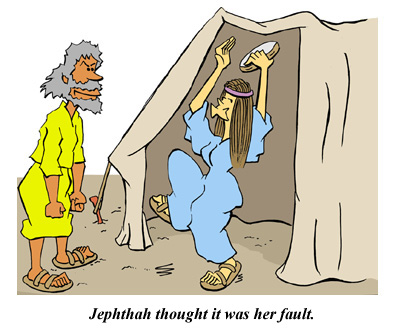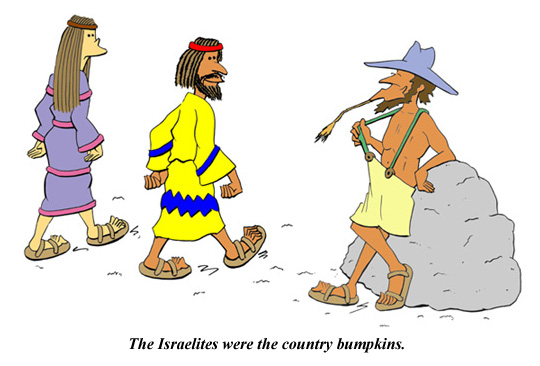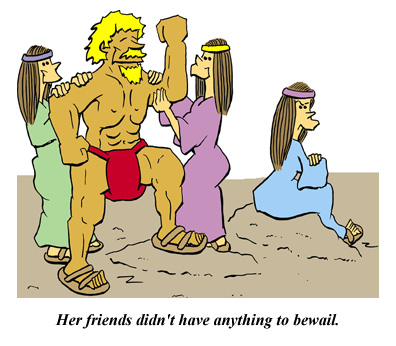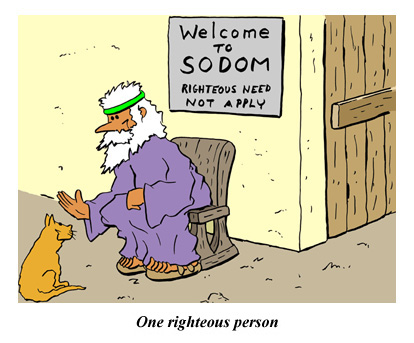Jephthah and His Big Mouth
(Judges 11: 1-40)
Jephthah is kind of a strange hero to find in
the Bible. In fact, he's a strange hero to find, period. But he was a
good warrior, and at the time that's what the Israelites needed. Too
bad he also had to be such a jerk.
The truth is Jephthah wouldn't have been anything except that his father, Gilead, liked fiddling around. As was the sometime custom, Gilead took the sprout of his wild oats into his house and raised him along with his other kids. Today that wouldn't make for a particularly harmonious home life (especially between the hubby and his helpmeet), but back then it was a pretty common thing to do. After all, without that type of stuff we'd never have heard of Leonardo Da Vinci either.
The real problems arose (as it did with Leonardo) when the pappy also had "legitimate" sons who didn't want to split their dad's inheritance with the product of their father's roving eye (or whatever it was that had been roving). So when Jephthah grew up, his brothers kicked him out of the house and told him to beat it.
Casting about for something to do, Jephthah became a great warrior for Israel. At least this was a job with plenty of opportunity. Although Joshua had - quote - "conquered Canaan" - unquote - some time before, the conquering left a bit to be desired.
The truth was that at the time Joshua and the Israelites - quote - "conquered" - unquote - the Promised Land, there was a bit of the glitch. The area was already ruled by the very people that Joshua (and Moses) had high tailed it from. That was the Egyptians. For a few centuries the Egyptians had been sending their armies led by the Pharaohs into Canaan. They would fight some battles and win a good chunk of them. The - quote - "defeated" - unquote - Canaanite people would promise to acknowledge the Pharaoh's authority and pay tribute. The Pharaoh would thank them with a polite tip of his double crown and ride back to Egypt, only to return the next year when the promised tribute was slow in arriving. Then the cycle would repeat itself.
So although the Pharaoh's authority may have been a bit tenuous, nominally the region was ruled by Egypt, and a few bands of nomads wandering around the country didn't bother them at all. But what Joshua did was move into the country, take over a few towns, kill the inhabitants, and set the Israelites up in the same country alongside the native inhabitants. The internal squabbling in Canaan didn't concern the Egyptians as it was an "internal" matter for the locals to handle. But Joshua's undoubted successes really irritated the Canaanites since as far as they were concerned, the Israelites were a bunch of country bumpkins.

Although some Israelites had moved into the towns, they had remained essentially a pastoral people. They tended their flocks and most still lived in tents in a semi-nomadic lifestyle outside the walled towns of the Canaanites. The Canaanites, on the other hand, were sophisticated city-dwellers and were into high-tech businesses like farming, olive growing, and making purple dye by squashing shellfish. The dealings between the two nations could be fractious, but even more problems were caused by other people coming into Canaan from the lands to the east. At one point Jephthah and his buddies went off to fight the Ammonites.
Now here's where Jephthah seems to have been something of an airhead. Before the fight he made a vow and beseeched the Lord saying, "If You will indeed give the sons of Ammon into my hand, then it shall be that whatever comes out of the doors of my house to meet me when I return in peace from the sons of Ammon, it shall be the Lord's, and I will offer it up as a burnt offering."
Now for crying out loud, just who did the heck Jephthah expect to come out of his house? An unblemished lamb? A fat oxen? Five dollars for the collection plate? All we can say was Jephthah sure kept strange house guests, or he just wasn't thinking.
Of course, when he got home, the first person to come and greet him was his daughter. She figured since her dad had trounced the Ammonites, she should celebrate his victory by playing the tambourine and dancing. But when Jephthah saw her, he knew he had screwed up.
When Biblical personalities pull a boner, the big thing for them to do is to lament and rend their garments. Then they follow that with a flowery speech of run-on sentences. Jephthah was no exception. So when he saw his daughter he tore his clothes and cried out, "Alas, my daughter, you have brought me very low; you have become the cause of great trouble to me for I have opened my mouth to the Lord [boy, did he ever], and I cannot take back my vow." From the way he was talking, you'd think it was her fault.
Nowadays if a teenage girl found out that her dad was intending to offer her to God as a burnt offering, the thing to do would be to tell her school counselor. Then the counselor would call social services, they'd call the cops, and Jephthah would get one to three for felony endangerment of a minor. Maybe a good lawyer could have gotten him probation with community service provided he get psychiatric help.
But back then there were no school counselors or social services. And what's worse kids respected their elders to the point of absurdity. So all Jephthah's daughter said was, "My father, if you have opened your mouth to the Lord [she should have said "your big mouth", but she was too nice for that] do to me according to what has gone out of your mouth [she was really rubbing it in here], now that the Lord has given you vengeance against your enemies, the Ammonites." From the length of her speech you can be sure she was Jephthah's daughter all right.
Her next request was quite reasonable under the circumstances. "Let this thing be done for me. Grant me two months, so that I may go and wander on the mountains, and bewail my virginity, my companions and I." So even back then young people had only one thing on their minds.
So off she went with her friends. How they
spent the next two months we don't know. Her friends certainly had a
bit better time than she did since they didn't have anything to
bewail. 
Some people like to discuss what "really" happened to Jephthah's daughter. The squeamish rationalize that he must have used some kind of loophole to get out of the deal. Some biblical commentaries even say it "isn't believed" that Jepthah sacrificed his daughter. Instead they say things like she just stayed "unblemished" (maybe she used cold cream every night) and "knew not a man", showing that at the least she ended up with a pretty limited social circle.
But to say Jephthah somehow got out of the deal is a strange argument for "the Bible says it / I believe it / that settles it" crowd to make. After all the Bible says flat out that Jephthah did as he vowed. So if the Bible says it, we believe it, and that settles it, then our story doesn't have a happy ending.
All this goes to show you that just because you're a Biblical hero, you can still be a jackass like anyone else. Certainly the main lesson here is you should keep your mouth shut when you should keep it shut. Or for heaven's sake, at least think about what you're saying before you run off at the mouth.
But there's another lesson here that most people miss, and you'd think Jephthah would have known it. And that's that no matter what he promised, he probably could have weaseled out of the deal. Before we go further we have to remember how Abraham handled the matter when the Lord decided he'd had a bellyfull of the goings-on in Sodom and Gomorrah.
You'll remember when the Big Guy got fed up with the people of Sodom, he figured he'd settle the issue by wiping them out. But Abraham thought that was a bit extreme. I mean, wiping out the righteous along with the wicked is pretty tough. So Abraham asked if he could find fifty righteous people would that be enough for the Lord to cancel the plan. Well, OK, the Main Man said, find me fifty righteous people, and I won't destroy the town.
Of course, like a good negotiator, Abraham
didn't start off with his best offer. He kept going. Well, he asked,
if you'll change your plan for fifty, why not for forty-five? OK, the
Lord replied, find forty-five and I won't do it. Well, Abraham asked
again, can we make it forty? OK, the Lord said, forty then. But
thirty-five is pretty close to forty, Abraham added, how about that?
All right, already, thirty-five it is. You know, Abraham said, I bet
there are at least twenty just men in Sodom. So can't we cut it down
to that? Well, OK, the Lord replied, I'll call everything off for
twenty men. Tell you what, said Abraham, I've got a deal and it's
good for today only; I'll swap you ten for your twenty. How about it?
For crying out loud, the Lord, said, all right. I'll make it ten. At
that point Abraham quit bargaining. 
Well, as anyone who's read the Bible knows, the next night every (literally) friggin' man in Sodom showed up at Lot's house wanting to do (to use Arlo Guthrie's phrase) "mean, nasty, ugly things" to the two heavenly guests that had stopped by Lot's to warn him to clear out. But what we can say is that here the Lord was going to let a few thousand of the wickedest people on earth off the hook so he could save ten righteous people. So you know darn well that if Jephthah had asked for some slack to get out of his deal, the Lord would have said, fine, bud, just watch your mouth in the future.
Actually even Abraham probably should have kept going. The Lord was clearly a softie, and Abraham could have kept paring the deal to having to find only one righteous man. Then the Lord would likely have said, all right, if you can find only one righteous man, then I won't do anything. Abraham would then have said, "Well, there's my nephew Lot there sitting at the gates." Then the Lord would have looked down and said, "Dang, I'd forgotten all about him." And that would have been that.